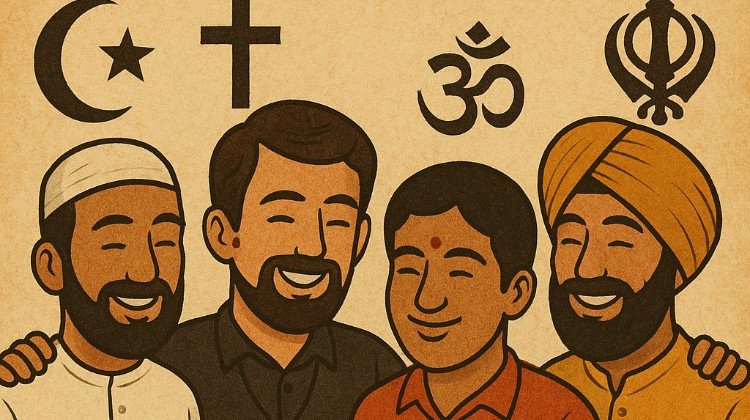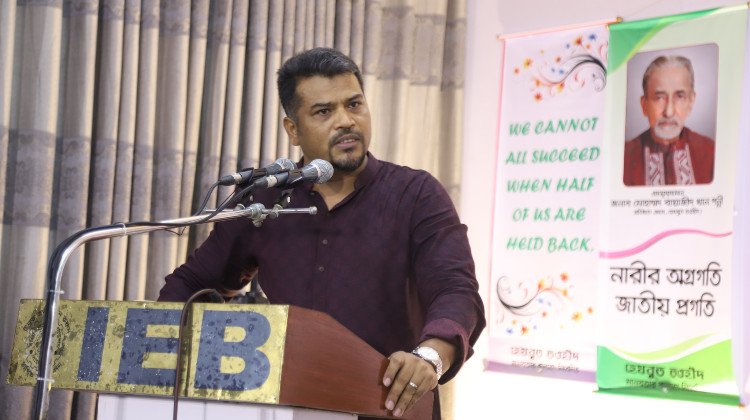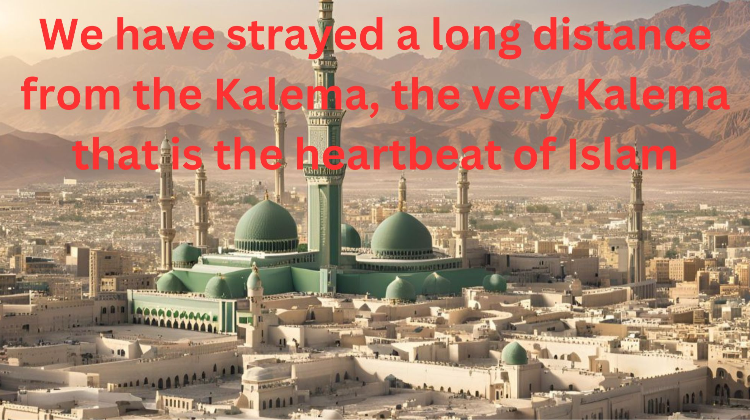The Possibility of Communal Harmony: One Nation Under One Creator
Category :
Religious Reflection

Author ::
Salzar Rahman Sabu
Feb 28, 2026
visibility
577 Read
Hezbut Tawheed often organizes dialogue sessions involving prominent figures from various religions. A recurring question arises: is it really possible to form a unified national identity comprising people of all faiths? My response is—it is absolutely possible, provided we all have the will to follow the command of one Creator, Allah.
If we can all commit to this, unity can be achieved instantly. The unfortunate truth is that, influenced by Western civilization’s ideology, most people today don’t even want humanity to be one nation. They seek diversity, fenced-off independent states. And those who do desire unity mostly don’t believe it's possible.
A major allegation of anti-religionists is that religion divides people. It’s undeniable that historically, massive bloodshed has occurred in the name of religion. Even in today’s secular global system, Huntington’s “Clash of Civilizations” continues.
Extremism is being incited, and under the guise of “war on terror,” millions of innocent people are being killed, and country after country is being destroyed.
Despite their liberal rhetoric, proponents of Western civilization are deeply infused with communal bias. Muslims have become the primary targets of this hostility. Before the invasion of Iraq, U.S. President George W. Bush called it a “crusade.”
The original Crusades were bloody wars (1099–1291) between Christians and Muslims over Jerusalem, ending in Christian defeat. In 1917, during World War I, the British took Jerusalem from the Ottoman Caliphate.
For centuries, the materialistic, godless civilization born in the West has dominated the world. It politically leveraged communal hatred to achieve this dominance. As a result, Islamophobia has become widespread. Though Western civilization claims to be indifferent to religious identity, even U.S. President Donald Trump implemented Muslim travel bans on 13 Muslim-majority countries.
Communal discord has long divided humans. In the Indian subcontinent, mistrust, hatred, and animosity have outweighed interfaith harmony. Over the last century, communal riots in Bangladesh, India, Pakistan, and Myanmar have killed millions and displaced many more. Partition itself was based on the Hindu-Muslim “Two-Nation Theory.”
Who is responsible for this division? Was it the intention of the One who revealed religion? Or is it that people, under Satan’s (Iblis) influence, became self-serving and disobeyed the Creator’s commandments?
If we study religious texts, we’ll see the Creator is one. He is the ultimate symbol of justice. His commands are just. Every religion divides actions into two categories: good and evil. Consequently, all humans are either righteous or sinful—those who obey God are righteous, those who disobey are sinners.
Hinduism originally had no caste system based on birth; rather, in the Vedas and Upanishads, social divisions were profession-based and flexible.
Similarly, Islam divides people into Mu’min (believers) and Kafir (those who reject truth). Mu’mins are those who believe in and strive to establish the Creator’s commands. Kafirs reject them. Nowhere does Allah say to forcibly convert, kill, or wage war against people of other religions. He commands fighting only those who reject the truth after it has been made clear.
Yet, Islamophobes falsely claim that Muslims are ordered to fight Jews, Christians, etc. This is distortion. The Qur’an even says that among people, those who say “We are Christians” are closest in affection to believers. (Surah Al-Ma’idah, 82). These verses reflected the political reality of that time—Negus, a Christian king of Abyssinia, supported the Prophet and was honored throughout his life and even prayed for after his death.
Muslims ruled India for 700 years. Had they imposed religion or nurtured communal hatred, how would Sanatan (Hindu) followers still be the majority?
All religions speak of two realms: this life and the hereafter, and of two destinations: heaven and hell—even Buddhism includes these, though modern Buddhism is atheistic. Many scholars argue that the Tripitaka contains monotheistic references. Those who believe in heaven and hell surely agree that humans didn’t create them.
The core beliefs of Abrahamic religions are identical—e.g., all humans descend from one couple: Adam and Eve. Even Vedic tradition mentions Swayambhu Manu and Shatarupa as the first man and woman. Muslims, Jews, and Christians all revere Abraham (Ibrahim) as the patriarch.
So, humanity is one family.
Accepting the command or sovereignty of the One Creator is the foundation of all religions. In Islam, La ilaha illallah means there is no legislator except Allah. This Tawheed was the core message of all Prophets. Allah says He sent messengers to every community with the message: “Worship Allah and shun Taghut (false authorities).” (Surah An-Nahl: 36)
Whenever false authority replaced Allah’s law, injustice and chaos spread. In response, God sent Prophets to reform people. Some accepted and unified under Tawheed; others clung to distorted beliefs. Thus, multiple religions emerged. Even when new divine teachings were established, followers later corrupted them, accepting multiple authorities.
In response, Allah sent new messengers again to restore unity under Tawheed. According to Hadith, 124,000 (or 224,000) Prophets were sent. Only 25 are named in the Qur’an. India, a cradle of ancient civilizations, surely received many Prophets. In Sanatan terminology, these were called avatars. Though their names may not appear in the Qur’an, their teachings align with those of Qur’anic Prophets.
Despite changes over time, religions share countless similarities. Islam is also called Din-ul-Qayyimah—eternal, upright religion. This aligns with the concept of Sanatan Dharma, which also emphasizes one eternal Creator. Its mantra “Ekam evadvitiyam” means “God is one, without a second.”
Similarly, Jesus (Isa a.s.) did not preach the Trinity but Tawheed. In the Bible, someone asked Jesus what the greatest commandment was. He replied, “Hear, O Israel: the Lord our God is One Lord.” (Mark 12:29). He also said, “Only one is lawgiver and judge.” (James 4:12)
The Bible says Jesus will return to destroy the Antichrist. Hadith also says Isa (a.s.) will return to destroy Dajjal and establish peace. If one examines the descriptions of Dajjal, it becomes clear that the materialistic, godless Jewish-Christian Western civilization is the modern manifestation of Dajjal.
The Qur’an states that every People of the Book will believe in Jesus before his death. (Surah An-Nisa: 159). Thus, Hindus, Jews, Muslims, Buddhists, and Christians—all will ultimately believe in him, becoming one nation of faith.
My purpose here is not comparative theology, but to present one grand truth: we are one nation. Our religions are divine commands sent by the same Creator at different times and places. The hostility among us is baseless. Two branches of the same tree cannot be enemies.
We should unite as brothers, forgetting religious hatred. The only division among us should be between justice and injustice. Let us accept God as the source of justice. All religions condemn theft, adultery, rape, tyranny, and oppression. Let’s unite against such evils.
Today’s injustice and violence stem from a soulless, Creator-less, materialistic civilization. Let us unite to reject it and strive with full sincerity to build a new civilization based on the command of the One Creator.
Images Related to this Post
Tags:
Search
Popular Post
Recent Post
Tags
Hezbut_Tawheed
Imam Hossain Mohammad Salim
Bangladesh Violence
Religious Extremism
Mob Attacks
Human Rights Violations
Minority Persecution
Rangpur Attacks
Jamaat-E-Islami
Hefazat-E-Islam
Tawheed
Muslim Ummah
Islamic Unity
Shirk
Kufr
Islamic Revival
Kalima-E-Tawheed
Obedience To Allah
Deen-Ul-Haq
Hizb-Ut-Tawheed
Ram Temple
Third Temple
Ayodhya
Jerusalem
Religious Politics
Babri Masjid
Al-Aqsa
Zionism
Hindutva
Netanyahu
Religious Hate
Muslim Unity
Noakhali Conference
Imam Salim
Islamic Movement
Shahidi Jame Mosque
Ht Members Conference
Bangladesh Religious Persecution
Islamic Reform Movement
Extremist Violence
Human Rights Bangladesh
Sonaimuri Noakhali Attack
Political Extremism Bangladesh
Faith-Based Violence
Eid Al‑Fitr
Zakat Al‑Fitr
Ramadan Charity
Islamic Social Justice
Community Harmony
Bangladesh Poverty
Islamic Economy
Sadaqah
Fitrana
Eid Unity
Arab History
Islamic Governance
Caliph Umar
Social Transformation
Women’s Rights In Islam
Justice In Islam
Political Systems
Islam Vs Democracy
Islam And Knowledge
Islamic System
Prophet Muhammad
Farewell Sermon
Hajj
Global Peace
Human Rights In Islam
Dhul-Hijjah
Arafat Sermon
Islam Vs Un Charter
Unemployment In Bangladesh
Education System Failure
Educated Unemployment
Jobless Graduates
British Education Legacy
Youth Crisis
Hezbut Tawheed Views
Bids Report
Ssc To Masters Job Race
Middle Class Dilemma
Kerani Mentality
Excessiveness In Religion
Religious Distortion
Overinterpretation Of Islam
Misguided Enthusiasm
Warnings Of The Prophet
True Islam
Spiritual Clarity
Abandoning The Mission
Chormonai Pir
Desherpotro
Islamic Reform
Persecution In Bangladesh
Religious Violence
Jamaat-E-Islami Attacks
Islamic Truth Movement
Women And Knowledge
Islamic Feminism
Gender Roles
Social Awareness
Muslim Women
Female Empowerment
Islamic History
Qur’anic Guidelines
Obeying Allah’s Commands
Islam And Suffering
Workers' Rights In Islam
Labor Justice
May Day Islam
Islamic Society Model
Chashirhat Development
Imam Hossain Mohammad Selim
Islamic Brotherhood
Fair Wages
Islamic Military Strategy
Tawheed-Based State
National Security
Qur’anic Warfare
Mujahideen
Peacekeeping
Modern Islamic Army
Military Training
Ummah Defense
Sharia Governance
Southasia
Extremism
Bangladesh
India
Pakistan
Myanmar
Jihad
Islamophobia
Radicalism
Resistance
Conflict
War
Terrorism
Proxywar
Bjp
Hasina
Ghazwa
Kashmir
Rohingya
Arsa
Militancy
Ideology
Unity
Awareness
Injustice
Arms
Geopolitics
Gaza
Hypocrisy
Taliban
Alqaeda
Afghanistan
Syria
Iraq
America
China
Russia
Media
Violence
Oppression
Nationalism
Muslim
Islam
Justice
Youth
Leadership
Sovereignty
Hezbuttawheed
Mosque
Governance
Society
Administration
Education
Military
Economy
Women
Culture
Law
Quran
Hadith
Prayer
Madinah
Baytalmal
Amir
Discipline
Khutba
Transparency
Spirituality
Training
Morality
Ummah
Prophet
Sharia
Community
Peace
Development
Security
National
Khutbah
Sabr
Zakat
Sufism
Equality
Mosquesystem
Participation
Aqiqah
Accountability
Tradition
Modernity
Ummati Muhammad
Unity In Islam
Sunnah
Islamic Teachings
Muslim World
Deen Of Islam
Security Crisis
National Unity
Political Unrest
Military Vulnerabilities
Strength
Solidarity
Disunity
Muslim Nations
Women's Rights
Rufaidah Panni
Eid Congregation
Islamic Women Empowerment
Social Justice
Equality In Islam
Momen
Kafir
Mushrik
Allah's Laws
Faith In Islam
Belief In Allah
True Believers
Kalimah
Shariah
Justice And Peace
Political Parties
Multiparty Democracy
Political Factionalism
Islamic Political System
Democracy Vs Islam
Secularism
Political Ideologies
Islamic Law
Political Vision
Governance Without Parties
Political Stability
Islamic State
Shura System
Islamic Perspective
Women’s Reform Commission
Family Law
Inheritance Law
Labor Recognition
Shariah Law
Gender Equality
Religious Opposition
Feminist Movement
Human Rights
Political Debat
Arab Society
Islamic Economic Justice
Military Transformation
Education In Islam
Judicial Independence
Accountability In Islam
Islam And Democracy
Societal Transformation
Governance Systems
Surah Yaseen
Islamic Guidance
Religious Work
Misguidance
Imam Role
Religious Commercialization
Truth And Falsehood
Religion And Society
Quranic Teachings
Ethical Leadership
Spiritual Struggle
Religious Scholars
Religious Corruption
Quranic Verses
Islamic Scholars
Prophet Muhammad (S.a.w)
Military Nation Of Islam
Sahabah
Lost Legacy
Ummah Of Muhammad
Jehad
Qetal
Islam And Violence
Islamic Leadership
State Vs Individual Struggle
Allah's Help
Islamic Reflection
Divine Support
Muslim World Crisis
Quran Teachings
Islamic Awakening
Qurbani
Bangladesh Politics
Eid Ul Adha
Islamic Sacrifice
Bangladesh Crisis
Global Conspiracy
Sacrifice
Labour Rights
Employment Crisis
Bangladesh Economy
Wage Gap
Inflation
Unemployment
Education Reform
Job Creation
Income Inequality
Post-Pandemic Economy
Eid-Ul-Azha 2025
Bangladesh Eid Congregation
Eid Prayer 2025
Women's Participation
Peace & Justice
Bangladesh Religious Events
Eid-Ul-Azha Message
Khilafah
Global Oppression
Islamic Festivals
Quranic Guidance
Spiritual Sacrifice
Ibrahim's Sacrifice
Eid Mubarak
Peace Through Tawheed
Women's Reform Debate
Bangladesh Women's Rights
Hezbut Tawheed Position
Islamic View On Women's Rights
Legal Reforms Bangladesh
Family Law Reform
Inheritance Rights
Sharia Law Bangladesh
Women's Equality
Western Influence
Religious Groups Debate
Gender Equality Islam
Islamic Social Solutions
Women's Dignity In Islam
Islamic Solutions
Beyond Politics
Labor Rights
Class Struggle
Economic Solutions
May Day Analysis
Economic Justice
Divine Accountability
Global Economic Crisis
Capitalism Vs Islam
Socialism Vs Islam
Savar Attack
Ishwardi Attack
Religious Fanaticism
Political Manipulation
Islamic Extremism
Government Response
Democratic Threats
Islamic Teachings Misuse
Radical Ideology
Communal Conflict
Radical Groups In Bangladesh
Terrorism In Bangladesh
Islamic Rights
Mosque Access
Eid Prayer
Muslim Women Empowerment
Prophet Muhammad Teachings
Women In Mosques
Women Rights In Islam
Gender Equality In Islam
Masjid An-Nabawi
Women's Role In Islam
Misconceptions About Women
Women Participation In Mosque
Eid Khutbah 2025
Islamic Sermon
Hossain Mohammad Selim
Bangladesh Eid
Qurbani Meaning
Women In Islam
Rufaydah Panni
Islamic Congregation
Female Participation In Eid
Chashirhat Eid
Palestine Solidarity
Eid Prayer Bangladesh
Women In Eid
Kushtia Rally
Gaza Crisis
Muslim Persecution
Bangladesh News
Peace Movement
Humanity
Divine Law
Social Reform
Religious Harmony
Truth
Call To Action
Palestine
Dajjal
Islamic Struggle
Mohammad Bayazid Khan Panni
Genocide
Oic
Protest
National Press Club
Rangpur Attack
Religious Reform
Karwan Bazar Protest
Terrorist Attack
Law And Order Failure
Emamht
Ht_In_Brief
Pabnaattack
Justiceforvictims
Humanchain
Politicalviolence
Legalreform
Endimpunity
Bangladeshjustice
Hezbuttawheedleaders
Demandjustice
Pabnapressconference
Policeinaction
Proposedgovernancesystem
Islamicstatesystem
Allahslaw
Economicreform
Educationreform
Capitalismcritique
Dhakaevent
Purposeofcreation
Humancreation
Khalifah
Allahsplan
Divineguidance
Adamsstory
Islamicteachings
Peaceandjustice
Sovereigntyofallah
Lailahaillallah
Islamiccreed
Aqidah
Islamicfaith
Iman
Deen
Peaceinislam
Purposeofislam
Beliefsystem
Faithandworship
Why
Escalate
Mohammad Bayazeed Khan Panni
Hossain Mohammad Salim
Religious
Extremist
Interfaith
Situation
Ultimatum
Threats
Extremist Attack
Attack
Movement
Barakat Hossain Osama
United Kingdom
Conservative Party
Donald Trump
Secular Leadership
Fanatical Populace
Fanatical
Populace
Religion
Extensive Damage
Catastrophic Flooding
High School
Urgent Help Needed
Devastated
Allah
Modus Operandi
Messenger
Believer
Messenger Of Allah
People
Human
Jame Mosque
A Cornerstone
Cornerstone
A Just Society
The Establishment
Establishment
History
Messenger Muhammad
Simple And Straightforward
Who Made
The Simple
Complex
Way Of Life
Jannah
Way To Jannah
Civilization
Religious Figures
Survive
Politics
Worship
Establish
Goals And Objectives
System Of Life
Money
Tolerance
Madness
Mo'men
Today’s
Educated
Needs
Corruption
British
Government
Democracy
Communism
Socialism
Political
Secular Education
Responsible
The Reign
Hindu
Terrifying
Slavery
Jewish Conspiracy
The Protocols Of The Elders Of Zion
Politician
Give And Take
Education System
European
Population
Mentality
Slave
Preface
Children
The Quran
The Miracle
Creator
The Creator
Creation Of Man
The Creation Of Man
Premise
First Words
Aqida
The Programme
The Messenger
Mankind
Actual
Concept Of Islam
Crossroads
Mojeza
The Call
Panni
The Author
Qur'an
Process
The Process
A Person
Tabook
The Special Three
Special
The Tabook
The Ahzab
Ahzab
Khandak
The Uhud
Uhud
The Badr
Badr
Ebadat
Ma'bud
Vicegerent
Worshipper
Aqaed
The Reasons
Reasons
Reason
Adam
Eblis
Khalifa
Angels
Adam And Eve
Adam And Hawa












Leave a Comment